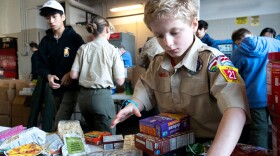-
Critics say the mission of the foundation is vague, leaving questions about how taxpayer dollars will be used. Half the funding for the foundation draws from the state's Temporary Assistance for Needy Families program, or TANF.
-
The bags contain a variety of essential, everyday items such as toothbrushes, toothpaste, deodorant, first-aid kits and water, as well as cold-weather items such as gloves and socks during the winter.
-
Toys for Tots, the 80-year-old program run by the U.S. Marines, is seeing toy donations down by almost 20% this year. Staff Sgt. Christian Martinez was once the recipient of one of those toys. Now, as coordinator of the Kansas City chapter of Toys for Tots, he's worried that other little boys won't get the same joy he did.
-
Every year just before the holidays, Scouting America troops across the country collect food items for local pantries, right off our front porches. It’s an effort started 40 years ago from here in Missouri.
-
Scouting for Food became a national Scouting America program in 1988, expanding across the country as thousands of scouts collectively gathered hundreds of thousands of pounds of shelf-stable goods for food insecure residents in their local communities.
-
Larry Lunsford of Kansas City will serve a one year term as president of Rotary International, starting in 2027. He told KCUR's Up To Date that his "heart is full of joy at the opportunity to serve in this meaningful way."
-
Kansas City Restaurant Week, which runs this year from Jan. 10-19, will give local diners a chance to get out of the house after the blizzard and explore the city's diverse eateries — with special menus and deals. A portion of Restaurant Week proceeds will also support local charity House of Hope.
-
An unexpected visitor changed the trajectory of Jerry Anselmo's life. In his memoir "When the Doorbell Rang," Anselmo tells the story of losing his son, and how it spurred him to form a nonprofit raising millions for Kansas City charities.
-
Got an old instrument collecting dust in your basement? One Kansas City fundraiser enlists regional artists to turn them into reclaimed works of art.
-
Got an old instrument collecting dust in your basement? One Kansas City fundraiser enlists regional artists to turn them into reclaimed works of art. Plus: Business owners in rural areas are struggling to find younger buyers.
-
In the days before Christmas, Flourish Furniture Bank, the only nonprofit of its kind in the Kansas City area, plans to fully furnish eight homes for people experiencing housing insecurity.
-
The officers were board members of the now-suspended Overland Park Police Officers Foundation. A recent audit suggested they violated the charity's bylaws and disbursed thousands of dollars to themselves over the years, although they're not currently facing criminal charges.
Play Live Radio
Next Up:
0:00
0:00
Available On Air Stations












